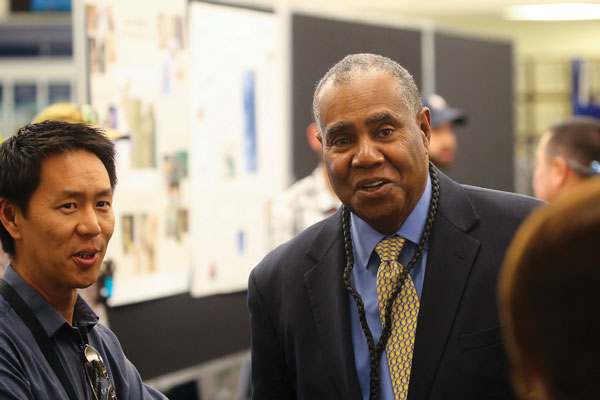Stark contrasts between the costs of climate disruption brought on by the fossil fuel economy and the value of investments in technology that could lead to a more sustainable future were the focus of Sandia’s keynote Earth Day talk by well-known journalist Steve Curwood.
Curwood, executive producer and host of public radio’s “Living on Earth,” spoke about “Investing in the New Energy Economy” to an audience of more than 200 in the Steve Schiff auditorium. His presentation examined the complexities of a transition from an energy portfolio dominated by fossil fuels, potential technological developments and future changes to the energy grid.

Faculty associate of the Harvard University Center for the Environment and professor of practice at the University of Massachusetts, Boston, Curwood shared thought-provoking insights and historical perspectives on the global, national and social aspects of renewable and non-renewable energy sources.
While it’s relatively easy to harvest energy from renewable resources such as solar, wind and nuclear power, the storage and distribution of that renewable energy is a much greater and more expensive challenge, he said.
Curwood illustrated the economic value of renewable energy storage and overhauling the electric grid by noting the unprecedented recent costs of climate-fueled storms, rising water levels on the coasts and devastating fires across the country.
Trees vs. CO2
Reminding the audience that trees are the most efficient way to reduce atmospheric carbon dioxide, he pointed to some difficult tradeoffs. To halt globally destructive deforestation or to dramatically reduce the need for coal-fired power, societies must find ways to replace the livelihoods of those dependent on such industries.
Such dilemmas come from “not having the connections with each other necessary to implement the changes we need,” he said. “It’s both our challenge and our opportunity. Ecology is systems thinking, and we need the people part and the connections among us.”
Curwood advocated for scientific literacy and education. Understanding nature and habitat is desperately needed as an anchor to support enduring solutions to climate disruption, he said.
“The most endangered species on Earth is us,” he said. “What do you do with endangered species? You protect their habitat.” To succeed in doing so, Curwood said citizens must use their social capital to build connections with one another.
New energy economy
Curwood told the audience that contributing to the new energy economy could be as simple as sharing information about the soon-to-decrease solar tax credit or as substantive as adding solar photovoltaics to a home.
After the talk, Curwood shared more advice.
“Look most closely at companies’ environmental, social and governance standards. How responsible are they being as a company?” he asked. “Do you want to invest in a bank that is investing in a bunch of coal-fired power plants?”
In the auditorium lobby after the talk, attendees browsed through 17 booths that provided resources and interactive opportunities for Sandia staff to learn more about reducing their environmental footprint at work and at home. There they learned how to join the Zero Waste Challenge, and more than 115 signed up.